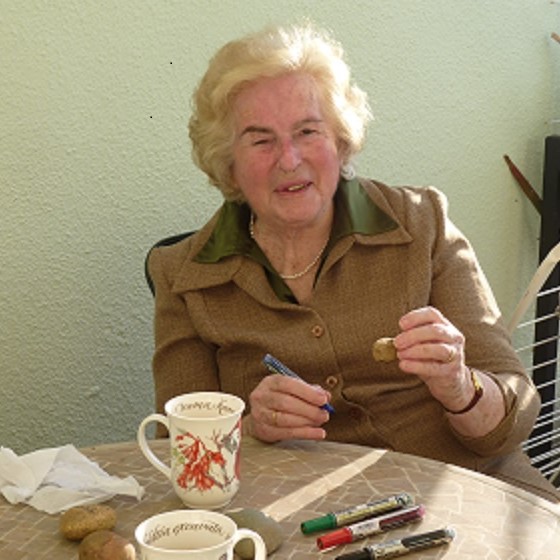Some Thoughts on Activities for People Living with Dementia

with our loved ones or clients with dementia
A daily routine can be helpful for people living with dementia. Have a look at the types of activities described below, and see if you can create a daily or weekly rhythm of experiences for your loved one or client. Think about when the person’s energy levels are high or low, and when the environment is conducive to being in or out (e.g. sunny rooms, cold rooms, wind, warmth, too bright, just right).
As we’ve all been experiencing during lockdown, days without meaning and purpose are crippling for the soul.
It helps to keep a diary so that family members, visitors and carers can record and report on what they find works well or not. Reviewing this occasionally will help everyone to learn from experience and refine the daily programme.
Encourage participation in the activities of daily living. Too much ‘doing things FOR someone’ results in learned helplessness. Rather do things WITH them, and set them up for success … then say ‘Well done!’ or ‘Thank you!’
Obviously, we must assess the person’s physical capability, e.g. their strength, balance and dexterity, as well as the stage of their dementia, and plan activities that are safe and likely to be completed successfully. Every day is different … so, stay open and flexible!
Types of activities include:
Physical activity – being outside, walking, dancing (with support), ball games, gentle stretches with breathing (check out seated tai chi / qigong movements for elders, or Ageless Grace sessions online), and activities of daily living like sweeping, dusting, making the bed, folding laundry and packing it away.
Help them successfully carry out useful activities in the kitchen, e.g. making tea, preparing and cooking food, washing up, cleaning surfaces; or outdoors, e.g. gardening, raking, mowing or washing the car.
Mental activity – Think about familiar activities related to the person’s career, e.g. sorting stationery / sewing materials / hardware / coins, filing invoices, or paging through company magazines and talking about pictures and article titles.
Do simple puzzles together: matching picture cards or shapes, provide jigsaws appropriate for their level of functioning; you can make your own out of laminated photos of family members, holidays, or things the person is interested in (flowers, cars, etc).
Games: Play card games like Snap or board games like Scrabble. Don’t try to follow the rules, allow words that don’t exist or spelling mistakes – it doesn’t matter!
Soul-food activities
Nature: Spend time in the garden / nature – watch and feed the birds, pick flowers and arrange them, appreciate beauty, watch the clouds and imagine the animals you see in them.
Music: Make or listen to their favourite music – create a playlist or select favourite CDs that visitors and carers can play. And do ask carers not to play music that irritates the person – they are likely to be from a much younger generation and your elder may not appreciate their choice of music! Depending on the stage of the condition, move, clap, drum or tap feet to the rhythm.
Make a songbook: Print out the lyrics of some of their favourite songs / hymns on their playlist (childhood songs are well remembered) so that you and others can sing with them. Large-print lyrics will also help the person to sing. Often the ability to read text remains, even though interpretation my fade.
Let them watch musical programmes on TV that are appropriate to their life experience, including old musicals.
Read poetry with a good rhythm and rhyme, even from school days – they may be able to read the text and may also remember well-known poems.
Other creative (art/craft) activities: Colouring in, drawing, painting, flower arranging, threading beads, building models (e.g. Lego), working with pipes and fittings, making a bird feeder, making a scrapbook or collage of relevant pictures (photos, magazines); knitting, crocheting, etc.
Cooking or baking: help in the kitchen – mixing, stirring, tasting, making tea (give help if needed).
Family contact (even in lockdown): Or go through a photo album (preferably with annotations) and reminisce. Record their stories as they come up … capture them before they disappear.
And of course there are the WhatsApp /Zoom calls I admit I’m rather sick of at this stage! They don’t make up for face-to-face connection, but I’m grateful for this mercy.
Outings and visits where possible. Use your discretion here … many people have already recovered from the virus and are no longer infectious!
Sprit:
The part of the brain responsible for spiritual practices like prayer appears to remain intact deep into a person’s dementia journey. What hymns, chants or other spiritual songs can you sing together? What scriptures, prayers or creeds are familiar and will bring comfort? What rituals are familiar and meaningful, like lighting a candle and saying a prayer; saying grace before meals, etc.
Self-care:
Having nails done, having someone do your hair, applying makeup, having a foot massage with scented lotion, dressing well, trying on a fetching scarf/tie or hat … all make us feel better. Especially if someone compliments us!
Rest and restoration – Many of us need time alone, so be sensitive to their need for space. Build in rest times – by the afternoon, people living with dementia tend to run out of steam, so give them bed rest or let them recline with their feet up listening to calming music. Sometimes a soft toy or cushion is comforting. But be sensitive … don’t be patronising. (But, hey! I LOVE a teddy, just so you know!)
And finally, this is all about trial and error. No day is the same. What works today might not work tomorrow. It’s just fine. So, repeat after me … “We are ALL just doing the best we can!”
Have fun!


Leave a Reply
Want to join the discussion?Feel free to contribute!